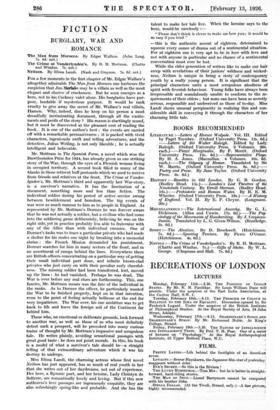• FICTION
BURGLARY, WAR AND - ROMANCE "The Man from Morocco. By Edgar Wallace. (John Long. 7s. ekt.' net.) - The Grime at Vanderlynden's. By R. H. Mottram. (Chatto
and" Windus. 74. net.) •
Neilson. By Elissa Landi. (Nash and Grayson. is. 6d. net.) Foa a few moments in the first chapter of Mr. Edgar Wallace's altogether admirable The Man from Morocco one harbours the suspicion thatJim Morlake may be a villain as well as the most elegant and elusive of cracksmen. But he soon emerges as a hero, not to his Cockney valet alone. His burglaries have pur- pose, laudable if mysterious purpose. It would be rank cruelty to give away the secret of Mr. Wallace's real villain, Maroon. Why, indeed, does he keep on his person a most dreadfully incriminating document, through all the excite- ments and perils of the story ? His reason is startlingly sound,
• but it must be discovered at the pleasant cost of reading the book. It is one of the author's best : the events are carried off with a remarkable persuasiveness ; it is packed with vivid characters, ingeniously swift and telling adventures, and the detective, Julius Welling, is not only likeable ; he is actually intelligent and believable.
Mr. Mottram in The Spanish Farm, a novel which won the Hawthornden Prize for 1924, has already given us one striking story of the War, through the eyes of a Flemish woman living in occupied territory. A second book filled in many of the blanks in those reticent buff postcards which we used to receive from friends and relatives at the front. The Crime at Vander- • lynden's, Mr. Mottram's third and apparently last War-story, is a survivor's narrative. It has the fascination of a document, something more and less than fiction. The individual soldier during his period of active service swung between bewilderment and boredom. The big events of . war were as much rumour to him as to people in England. As represented by Mr. Mottram's Dormer he was forever aware that he was not actually a soldier, but a civilian who had come into the soldiering game .deliberately, believing he was on the right side, yet in practice probably less able to fraternize with any of the Allies than with individual enemies. One of Dormer's tasks was to trace a particular private who had made a shelter for his mules one night by breaking into a memorial shrine : the French Mission demanded his punishment. Dormer searches for him in many sectors of the front, and in an assortment of camps behind the lines. Everywhere there are British officers concentrating on a particular way of getting their small individual part done, and infinite brown-clad privates who just carry on with their peculiar surly cheerful- ness. The missing soldier had been transferred, lent, moved up the lines : he had vanished. Perhaps he was dead. The War is over before any real clues are forthcoming. This, one fancies, Mr. Mottram means was the fate of the individual in the ranks. As to Dormer the officer, he particularly wanted the War to be finished properly, kept on in that intention, even to the point of feeling actually bellicose at the end for very impatience. The War over, his one ambition was to get back to life and leave the foreign soil of the Continent far behind him.
Those who, on emotional or deliberate grounds, look forward to another war, as well as those of us who most definitely detest such a prospect, will be provoked into many curious trains of thought by Mr. Mottram's impassive and scrupulous tale. He writes plainly, avoiding sensational passages with great good taste; he does not point morals. In this, his book is a model of what a survivor's tale should be—a straight telling of that extraordinary adventure which it was his destiny to undergo.
Miss Elissa Landi, the charming actress whose first novel Neilson has just appeared, has so much of real youth in her that she writes out of her daydreams, not out of experience. Her hero, a Byronic poet, and her heroine, Lady Christyn de Solterre, are romantically lovely and loving. But if this new .authoress 's love passages are ingenuously exquisite, they are also refreshingly spring-like and probable. And she has the
talent to make her tale live. When the heroine says to the -hero, would-be carelessly :— ;
"Please don't think it clever to make me love you; it would be so easy if you tried "
—this is the authentic accent of eighteen, determined to squeeze every ounce of drama out of a sentimental situation. For at:eighteen one is very apt to _be. in love with "love and not with anyone in particular and no chance of a sentimental
conversation must.ever be lost. . - • - -- -
While the elder generation of writers like to make our hair creep with revelations of their juniors wildness and wicked- ness, Neilson is unique in being a story of contemporary youth by a really young person. It is significant that the • principal characters unite a most scrupulous aloofness of spirit with feverish behaviour. Young folks have always been irrepressible and scandalously unable to conform to the re- quirements of their elders ; but none can have been so secretly serious, responsible and undeceived as those of to-day. Miss Landi shows unusual perspicacity in realizing this and con- siderable skill in conveying it through the characters of her charming little tale.


















































 Previous page
Previous page